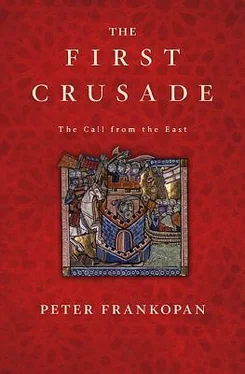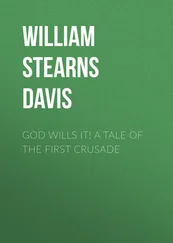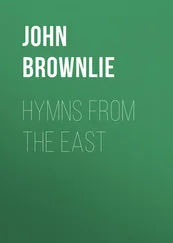Breaching the gate, the Crusaders streamed into Antioch, bludgeoning and hacking their way deeper and deeper into the city as its bewildered inhabitants were roused from their sleep. Bohemond was focused on one thing: to raise his battle standard on the highest point of the walls as quickly as possible. This would show that the city had been captured and was now in Christian hands. But it was also a declaration to the other Crusaders that Antioch had fallen to Bohemond; even in the heat of battle, he was already thinking about its aftermath. 30
Things quickly went the Crusaders’ way as Antioch’s other gates were flung open by its non-Muslim inhabitants. Some took the full brunt of the furious onslaught of the soldiers fighting their way through the city street by street, with many of the Christians living in the city killed in the process. In the dark, overwrought with fear and adrenaline, there was no time to separate friend from foe. The storming of Antioch was brutal. For days afterwards, corpses lay in the streets, the rotting bodies producing a putrid smell in the heat of the early summer. ‘All the streets of the city on every side were full of corpses,’ reported one eyewitness, ‘so that no one could endure to be there because of the stench, nor could anyone walk along the narrow paths of the city except over the corpses of the dead.’ 31
The city’s commander, Yaghi-Siyhan, fled in panic, escaping into the neighbouring mountains. He was recognised by three locals, all of them Christian, who dragged him off his mule and decapitated him with his own sword. His distinctive head – huge, with great hairy ears and a waist-length beard – was brought back to Antioch as a trophy and presented to the Crusaders. 32
After eight long, painful months, Antioch finally fell on 3 June 1098 – although the citadel, the strong fort within the city, still held out. Thousands of Crusaders had died during the siege, and countless numbers had been wounded. Others had deserted and headed home. Nevertheless, it had ended in triumph. Those who made it into the city had no time to enjoy their success, however; Kerbogha’s army arrived the very next day.
The advancing force was far larger than those assembled by the governors of Damascus and Aleppo. Rather than rush his assault, Kerbogha deployed his resources carefully, setting up camp by the walls and making contact with the defenders of the citadel. Having established that the Crusader army was exhausted, depleted and apprehensive, he ordered a ferocious assault from the citadel’s garrison.
The Crusaders managed to resist the initial attack and Kerbogha now decided to suffocate the city by mounting a blockade. The besiegers had become the besieged. Communications from Antioch to the outside world were cut off, although a delegation to the Byzantine emperor with a desperate message calling for help had managed to set off just before Kerbogha’s arrival. Later attempts to break out of the city were dealt with by the Turks with ease.
Kerbogha’s blockade quickly had an effect. After months of siege, there were no more supplies within the city. ‘Our men ate the flesh of horses and asses and sold it to one another’, reported one chronicler; ‘a hen cost 15 shillings, an egg two and a walnut a penny ... so terrible was the famine that men boiled and ate the leaves of figs, vines, thistles and all kinds of trees. Others stewed dried skins of horses, camels, asses, oxen and buffaloes which they then ate.’ 33Indigestible plants were gathered and cooked, often poisoning those who ate them. Some resorted to eating shoes and other leather goods; others drank the blood of their horses. 34For some, like Fulcher of Chartres, there was an obvious explanation for this suffering: many Crusaders had slept with local women both before and after taking the city. God was now punishing such wanton fornication. 35
More than at any point during the expedition so far, the Crusaders needed a miracle – and they got one. A man of no particular distinction named Peter Bartholomew came forward to tell Raymond of Toulouse and the bishop of Le Puy that visions of St Andrew had been appearing to him for several months in which the saint revealed the location of the lance that had pierced Christ’s side. After searching the city under Peter’s direction, part of the Holy Lance was eventually recovered under the floor of the Church of St Peter in Antioch. 36The find provided a major boost at a time when morale was at an all-time low. To the Crusaders, the discovery of such an important relic, particularly one that typified suffering, seemed highly significant – even if later commentators were dismissive of its authenticity. It helped strengthen resolve at a critical moment, when the knights ‘did not have the strength to suffer these things and linger; so great and small consulted together, saying it was better to die in battle than to perish from so cruel a famine, growing weaker day by day until overcome by death’. 37
The expedition leaders now decided to meet the enemy army head-on. The order was given that although supplies were all but exhausted, horses should be given as much feed as possible to boost their stamina. For three days before engaging the Turks, the Crusaders took part in solemn processions, celebrations of the Eucharist, and making confession. 38Then, on 28 June 1098, the westerners marched out from Antioch and crossed the Bridge Gate over the Orontes, fanning out in front of the city in four brigades. This took Kerbogha by complete surprise. Playing chess when he heard that a sortie was under way, he lost precious time asking for confirmation that the reports were accurate and considering how he should respond. He simply could not believe that anyone would be so brave – or so stupid – as to try to break out of the city. 39
At this point, the Crusade could have unravelled. Antioch itself was left essentially undefended, save for a small contingent under the command of Raymond of Toulouse, who remained behind, once again suffering from illness. The group that stayed with him, numbering just 200 knights, was all that there was to stop the garrison in the citadel retaking control of the city. Kerbogha, meanwhile, did nothing, failing to attack the Crusaders at their most vulnerable as they crossed the river. 40
When Kerbogha finally ordered an attack, the western knights once again crucially managed to hold their formation. This caused panic in Kerbogha’s army, already unnerved by the reputation the westerners had gained from previous successes. The Crusader forces kept their discipline, sending small units into the heart of the enemy army, which splintered under the pressure of the heavy cavalry charges. Kerbogha’s troops started to melt away, their commander fleeing like a deer, according to one eyewitness. His camp and everything in it was captured, including many Turkish women who had been brought along in anticipation of the celebrations that were to accompany Kerbogha’s recovery of Antioch and his destruction of the Crusader army. The westerners did these women no evil, wrote Fulcher of Chartres, ‘but they did drive lances into their stomachs’. 41
What had looked like the endgame for the expedition to Jerusalem suddenly became its most glorious hour. So extraordinary was the success against Kerbogha’s army that even those who witnessed it struggled to understand how the victory had been achieved. According to Raymond of Aguilers who fought in the battle, Kerbogha’s flight was caused by God sending a divine shower on to the Christian army which inspired it with graces, fortitude and hatred of the enemy. 42Another eyewitness agreed that divine intervention had been involved, with the appearance of countless supernatural knights, all bearing white standards and led out by saints George, Mercurius and Demetrius, alongside the Crusaders. 43For yet another chronicler, it was the relic of the Holy Lance itself that had brought victory, striking cold fear into Kerbogha’s heart the moment he saw it and causing him to flee. 44Arab contemporaries had a little more insight. Kerbogha was an arrogant man whose personality and behaviour had not endeared him to other emirs, they reported; his refusal to let them kill captured knights had proved particularly unpopular. Moreover, he was let down in the battle by enemies within his own army who had taken a vow to betray him at the first opportunity. 45
Читать дальше











